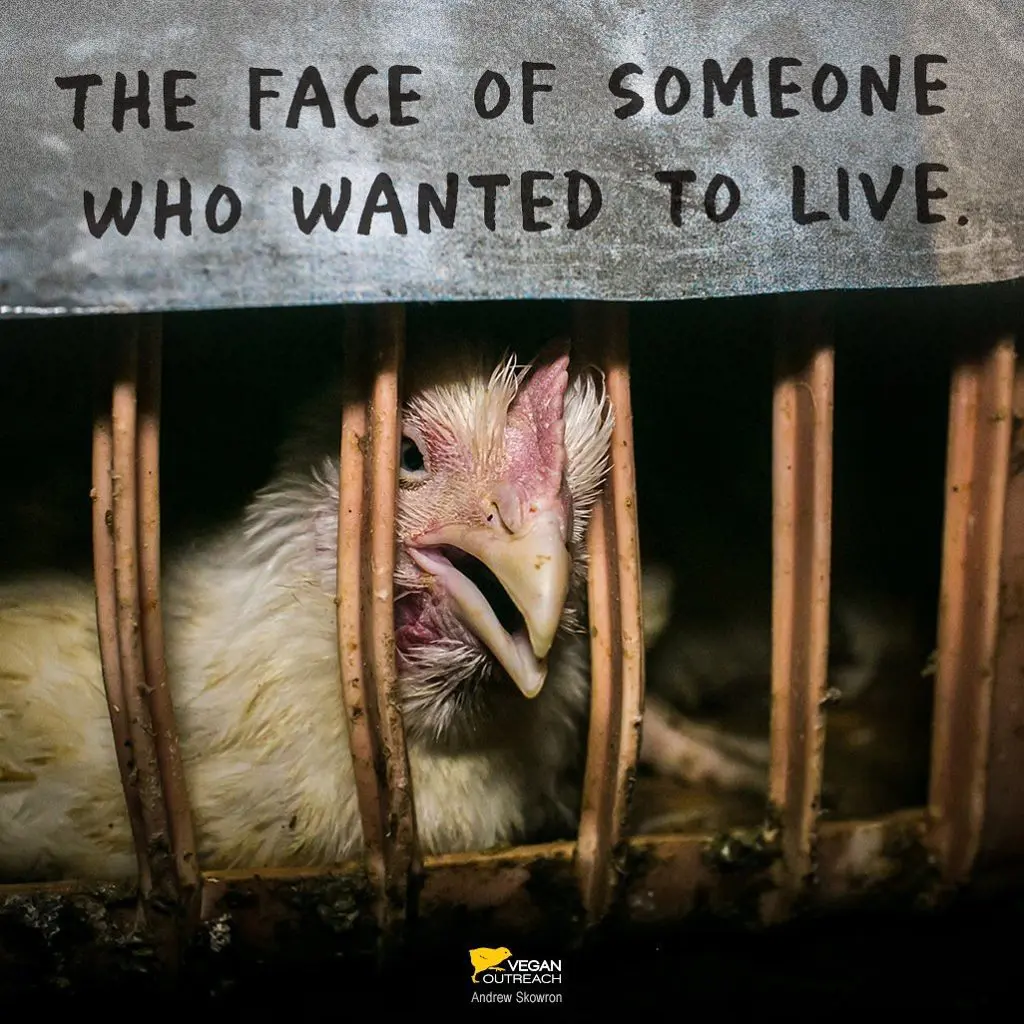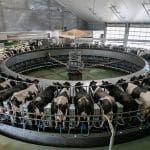De bio-industrie is een goed verborgen industrie, gehuld in geheimhouding en waardoor consumenten de ware omvang van de wreedheid die achter gesloten deuren plaatsvindt, niet kunnen begrijpen. De omstandigheden in de bio-industrie zijn vaak overbevolkt, onhygiënisch en onmenselijk, wat leidt tot enorm lijden voor de betrokken dieren. Onderzoek en undercoverbeelden hebben schokkende gevallen van dierenmishandeling en -verwaarlozing in de bio-industrie aan het licht gebracht. Dierenrechtenactivisten werken onvermoeibaar om de duistere waarheid van de bio-industrie bloot te leggen en pleiten voor strengere regelgeving en normen voor dierenwelzijn. Consumenten hebben de macht om een verschil te maken door ervoor te kiezen ethische en duurzame landbouwpraktijken in plaats van de bio-industrie.

Varkens op industriële boerderijen leven vaak in omstandigheden die hen blootstellen aan enorm lijden als gevolg van stress, opsluiting en het ontbreken van basisbehoeften. Ze worden doorgaans gehouden in overvolle, kale ruimtes zonder goed beddengoed, ventilatie of ruimte om natuurlijk gedrag te vertonen, zoals wroeten, ontdekken of socialiseren. Deze krappe omstandigheden, gecombineerd met blootstelling aan afval, slechte luchtkwaliteit en constante stress, leiden tot angst en lijden. Varkens vertonen vaak stressgedrag zoals staafbijten of agressie als gevolg van dit gebrek aan stimulatie en vrijheid.
Naast deze barre levensomstandigheden worden varkens in de bio-industrie zonder verdoving blootgesteld aan pijnlijke en inhumane praktijken. Procedures zoals het couperen van de staart, het knippen van tanden en het inkepingen van de oren worden uitgevoerd om letsel te voorkomen en de efficiëntie van de boerderij te garanderen, maar ze veroorzaken aanzienlijke pijn en lijden. Moedervarkens worden tijdens de dracht en geboorte ook opgesloten in kleine, krappe kraamhokken, waardoor ze niet goed voor hun pasgeboren jongen kunnen zorgen. Deze omstandigheden zorgen ervoor dat varkens in een constante staat van fysieke en emotionele stress verkeren, wat de wreedheid en uitbuiting benadrukt die zij in industriële landbouwsystemen ondergaan.
Koeien en kalveren in industriële landbouwsystemen ondergaan enorm lijden als gevolg van opsluiting, uitbuiting en onmenselijke praktijken. Vooral melkkoeien worden vaak gehouden in overvolle, krappe ruimtes met weinig toegang tot weidegrond of natuurlijke omgeving. Ze worden vaak onderworpen aan continu melken, wat kan leiden tot fysieke uitputting, mastitis (een pijnlijke uierinfectie) en andere gezondheidsproblemen. Kalveren daarentegen worden kort na de geboorte van hun moeder gescheiden, een proces dat zowel fysiek als emotioneel traumatisch is. Deze gedwongen scheiding ontzegt kalveren de essentiële moederlijke binding die ze nodig hebben tijdens hun vroege levensfasen.
Kalveren die voor kalfs- of zuiveldoeleinden worden grootgebracht, worden ook geconfronteerd met intens lijden in fabriekssystemen. Ze zijn opgesloten in kleine kratten of beperkende omgevingen die hun vermogen beperken om te bewegen, te oefenen of natuurlijk gedrag te vertonen. Deze omgevingen belemmeren hun groei en veroorzaken psychologische stress. Daarnaast worden kalveren onderworpen aan pijnlijke procedures, zoals onthoornen en brandmerken, vaak zonder verdoving. De stress van het vroeg spenen, de harde opsluiting en het gebrek aan goede zorg veroorzaken enorme fysieke en emotionele pijn voor zowel koeien als kalveren. Dit lijden benadrukt de noodzaak om moderne landbouwpraktijken opnieuw te onderzoeken en prioriteit te geven aan het welzijn van deze bewuste dieren.
Kippen, eenden, ganzen en kuikens die in industriële landbouwsystemen worden grootgebracht, worden geconfronteerd met ernstig lijden als gevolg van overbevolking, opsluiting en onmenselijke behandeling. Deze vogels worden vaak in extreem kleine ruimtes gehouden met weinig of geen toegang tot buitenruimtes, waardoor ze geen natuurlijk gedrag kunnen vertonen, zoals foerageren, stofbaden en vliegen. In de bio-industrie worden deze vogels doorgaans gehuisvest in grote, overvolle pakhuizen met slechte ventilatie en onhygiënische omstandigheden, waardoor het risico op ziekte en stress toeneemt. Veel vogels hebben last van overbevolking, wat leidt tot verwondingen, ziekten en de dood.
Bovendien worden kuikens en jonge vogels onderworpen aan pijnlijke procedures, zoals het knippen van de snavel, om agressief gedrag te voorkomen dat voortkomt uit de stress van opsluiting en overbevolking. Deze praktijken zijn pijnlijk en traumatisch en worden vaak uitgevoerd zonder de juiste pijnverlichting. Eenden en ganzen worden ook uitgebuit in fabriekssystemen, waar ze worden opgesloten voor de fokkerij of gedwongen worden snel te groeien om aan de vraag te voldoen. Deze onnatuurlijke groeipatronen leiden tot lichamelijk lijden, waaronder misvormingen en gewrichtspijn. Het gebrek aan goede verzorging, beweging en toegang tot natuurlijke omgevingen zorgt ervoor dat kippen, eenden, ganzen en kuikens in een constante staat van angst en pijn verkeren, wat de wreedheid van intensieve landbouwpraktijken onderstreept.
Vissen en waterdieren worden in de moderne visserij- en aquacultuursector geconfronteerd met enorm lijden als gevolg van overbevolking, slechte levensomstandigheden en uitbuitende oogstmethoden. Bij viskwekerijen in fabrieksstijl wordt de vis vaak gehouden in overvolle tanks of hokken met beperkte ruimte, slechte waterkwaliteit en hoge concentraties afval. Deze omstandigheden leiden tot stress, ziekte en een verzwakt immuunsysteem, waardoor vissen kwetsbaar worden voor infecties en verwondingen. Waterdieren kunnen niet ontsnappen uit deze besloten ruimtes, waardoor hun lijden toeneemt terwijl ze worstelen in onnatuurlijke en zeer stressvolle omgevingen.
Wilde vissen en andere waterdieren lijden ook onder de industriële visserijpraktijken. Methoden zoals trawlvisserij, netten en beugvisserij resulteren in massale bijvangst, waarbij talloze niet-doelzeedieren – waaronder dolfijnen, zeeschildpadden en zeevogels – per ongeluk worden gevangen en gedood. Overbevissing leidt tot een verdere uitputting van de vispopulaties, waardoor ecosystemen en het voortbestaan van watersoorten worden bedreigd. Veel vissen worden tijdens de oogst ook onderworpen aan wrede behandelingen, waarbij ze bijvoorbeeld uit de oceaan worden gesleept en door de blootstelling worden achtergelaten om te stikken of te sterven. Deze praktijken exploiteren waterdieren voor menselijke consumptie en veroorzaken onnodige pijn, lijden en ecologische schade, wat de dringende behoefte aan duurzame en humane alternatieven onderstreept.
Onthulling van de verschrikkingen: dierenmishandeling in de massaproductie-industrie
Dierenmishandeling komt veel voor in de massaproductie-industrie, waarbij de bio-industrie een belangrijke bijdrage levert.
Dieren op industriële boerderijen worden vaak onderworpen aan fysieke mishandeling, waaronder opsluiting, verminking en verwaarlozing.
Het massaproductiemodel geeft voorrang aan winst boven dierenwelzijn, wat leidt tot wijdverbreid misbruik en lijden.
Undercoveronderzoek heeft alarmerend bewijs geleverd van de verschrikkingen die dieren ondergaan in de massaproductie-industrie.
Door humane en duurzame landbouwpraktijken te ondersteunen, kunnen consumenten helpen dierenmishandeling in de massaproductie-industrie te bestrijden.
De prijs van gemak: dierenwelzijn opofferen voor goedkoop vlees
De bio-industrie geeft prioriteit aan efficiëntie en lage kosten, vaak ten koste van het dierenwelzijn.
Voor goedkoop vlees geldt een hoge prijs voor dieren, die worden onderworpen aan wrede en onnatuurlijke omstandigheden om de kosten laag te houden.
Consumenten die voor goedkoop vlees kiezen, dragen onbewust bij aan de cyclus van dierenmishandeling en lijden in de bio-industrie.
Door te kiezen voor ethisch gefokt en humaan geslacht vlees ondersteunt men duurzame landbouwpraktijken waarbij dierenwelzijn voorop staat.
Het vergroten van het bewustzijn over de werkelijke kosten van goedkoop vlees kan consumenten aanmoedigen om meer medelevende keuzes te maken als het om voedsel gaat.

Het lijden van dieren tijdens transport
Dieren die worden vervoerd voor de landbouw, de slacht of andere commerciële doeleinden ondergaan tijdens hun reizen onvoorstelbaar lijden. Het transportproces gaat vaak gepaard met overbevolking, slechte behandeling en barre omgevingsomstandigheden waardoor dieren in een constante staat van stress verkeren. Velen zitten opeengepakt in vrachtwagens, treinen of schepen met weinig tot geen bewegingsruimte, en moeten uren of zelfs dagen in hun eigen afval staan zonder toegang tot voedsel, water of onderdak. Deze omstandigheden leiden tot uitdroging, uitputting en ziekte, en veel dieren overleven de reis niet.
Bovendien vergroot de ruwe behandeling door werknemers tijdens het laden, lossen en transport het lijden alleen maar. Verwondingen, paniek en trauma komen vaak voor omdat dieren moeite hebben om met de onbekende en beperkte ruimtes om te gaan. Extreme weersomstandigheden, zoals verzengende hitte of vrieskou, verergeren het lijden nog verder, omdat dieren niet kunnen ontsnappen of hun lichaamstemperatuur kunnen reguleren. Dit wrede en onnodige deel van de toeleveringsketen benadrukt de dringende behoefte aan humane transportmethoden, betere normen voor dierenwelzijn en strenger toezicht om dergelijke pijn en lijden te voorkomen.
De wreedheid van slachthuizen blootleggen
Slachthuizen zijn plaatsen van immens lijden en wreedheid voor dieren, waar ze worden onderworpen aan onmenselijke behandeling, stress en wrede omstandigheden. Bij aankomst in een slachthuis worden dieren vaak in overvolle vrachtwagens of hokken gedwongen zonder toegang tot voedsel, water of onderdak, wat leidt tot extreme stress en uitputting. Veel dieren arriveren bij deze faciliteiten al verzwakt of gewond als gevolg van ruwe behandeling tijdens het transport, overbevolking of gebrek aan zorg.
In het slachthuis worden dieren vaak blootgesteld aan gruwelijke omstandigheden. Procedures zoals bedwelming, bloeding en moord worden vaak uitgevoerd op een manier die overhaast, onjuist wordt uitgevoerd of nalatig is, wat leidt tot langdurig lijden. In sommige gevallen worden dieren niet bewusteloos gemaakt voordat ze worden geslacht, waardoor ze volledig bij bewustzijn blijven als ze worden gedood. De stress van een onbekende omgeving, harde geluiden en de aanwezigheid van andere dieren in nood vergroten hun angst en lijden alleen maar. Bovendien kunnen werknemers dieren blootstellen aan verdere mishandeling door onjuiste behandeling of wreedheid. Dit systematische en geïnstitutionaliseerde geweld in slachthuizen benadrukt de noodzaak om ethische praktijken aan te pakken, betere regelgeving te implementeren en meer meelevende alternatieven voor de uitbuiting van dieren aan te nemen.
















































